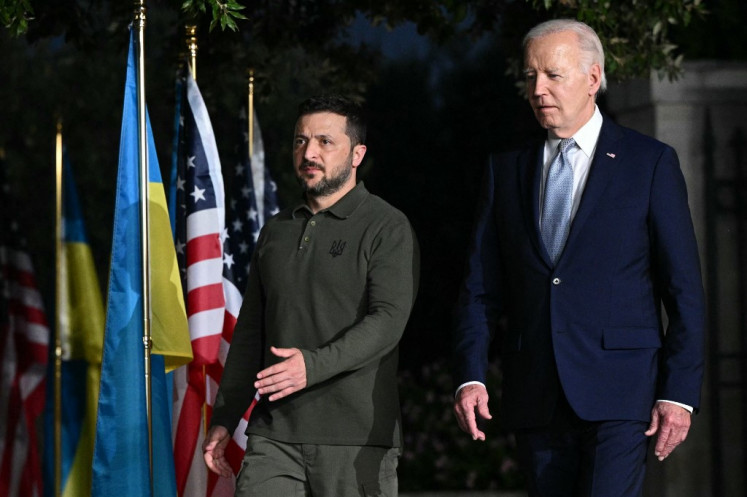Editorial: Treating, curing terrorism
The magnitude of an event or an issue is determined by the scale, frequency and quality of elements that help build and shape that particular event or issue
Change Size

T
he magnitude of an event or an issue is determined by the scale, frequency and quality of elements that help build and shape that particular event or issue. The country’s antiterrorism campaign received a significant boost on Thursday, with three key antiterrorism activities that presumably strengthened the magnitude of efforts to rid our country of terror.
First and foremost was the 20-year jail sentence handed down by the West Jakarta District Court to bombing mastermind Umar Patek. Earlier, state prosecutors had demanded that Patek be given a life sentence for his alleged role in the 2002 Bali bombings.
Once again, Indonesia has shown to the world its commitment to fighting terrorism through strict law enforcement. Not all terrorist suspects were brought to justice — some of them were shot on sight, but the country’s faith in the power of law to combat terrorism is beyond doubt.
Patek, who was arrested in Pakistan last year, was charged under six accounts, including charges of illegal arms possession, smuggling rifles into the country and of training others to use them, premeditated murder and document forgery. He was also charged with playing an active role in the Bali bombings on Oct. 12, 2002, which killed 202 people, mostly foreigners.
Second was the coordination meeting of the National Counterterrorism Agency (BNPT) on antiterrorism and counterterrorism activities at the Group-2 headquarters of the Army’s Special Forces (Kopassus) in Kartasura, near Surakarta in Central Java. The meeting was held to synergize the activities of all antiterrorism units within the Indonesian Military (TNI), the National Police (Polri) and the BNPT itself.
The ongoing metamorphosis of Indonesian terrorists and terror organizations was revealed during the meeting, with the country’s antiterrorism authorities identifying the reduced quantity but improving quality of acts of terrorism. Such an improvement in terrorists’ tactics and strategies can be seen in their use of cybercrime for their fundraising activities.
The coordination meeting of antiterrorism authorities has also identified the transfer of the terrorists’ base of operations from Surakarta to new locations spread across the country. Their organization and training bases are now situated in East Java, West Nusa Tenggara and Sulawesi, while North Sumatra has been identified as the center of their fundraising activities and Bali as their operational target area, due to the fact that the resort island is the country’s main tourist destination.
Third was the arrest by the Police’s Densus 88 counterterrorism unit of five suspected terrorists, two of whom were IT experts, in Medan, North Sumatra. The police seized Rp 8 billion (US$848,000) worth of assets from the suspects, which included four houses, one shop and a number of cars and motorcycles.
The verdict on Patek and the discovery of Indonesian terrorists’ new tactics and strategies by the BNPT and other antiterrorism authorities constitute significant achievements of the country’s antiterrorism campaign. All those measures, however, focus on “extinguishing” the fires (terror acts), while efforts taken to prevent and tackle the “root causes” of terrorism, such as poverty and radical religious teachings, have apparently been on the decline.
The verdicts against terrorists such as Patek, along with antiterrorism operations, are apparently “hard power” approaches toward terrorism. They are an essential part of antiterror activities, but a more comprehensive antiterrorism campaign, and one that will bring with it more complete success, will need to include “soft power” measures, such as poverty eradication and better education to contain radical religious teachings.









